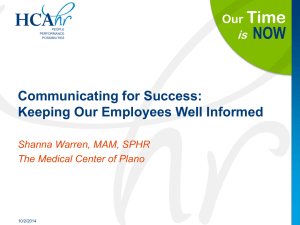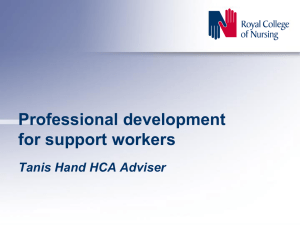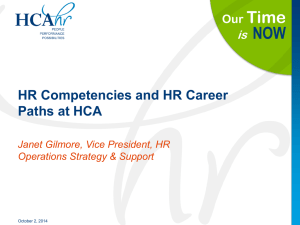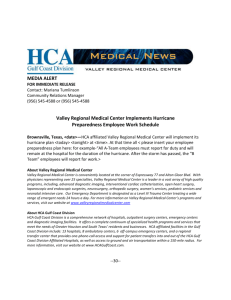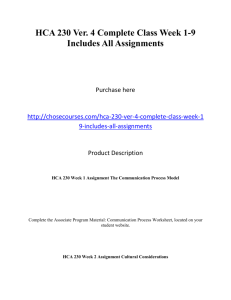Leadership Riverside Speech
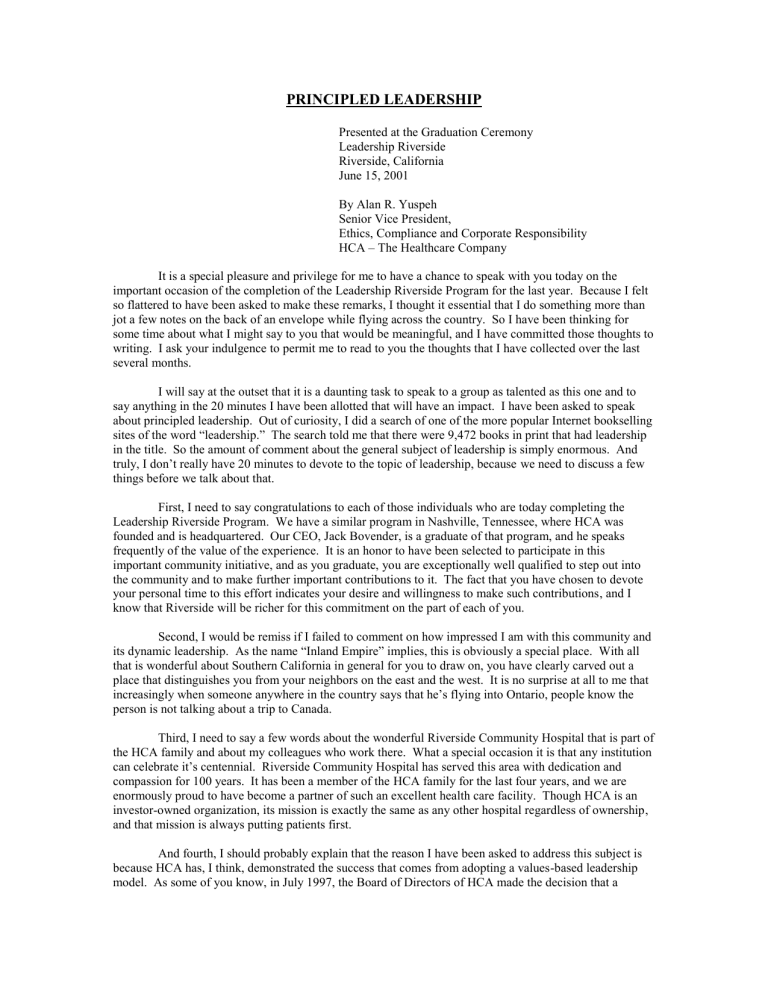
PRINCIPLED LEADERSHIP
Presented at the Graduation Ceremony
Leadership Riverside
Riverside, California
June 15, 2001
By Alan R. Yuspeh
Senior Vice President,
Ethics, Compliance and Corporate Responsibility
HCA – The Healthcare Company
It is a special pleasure and privilege for me to have a chance to speak with you today on the important occasion of the completion of the Leadership Riverside Program for the last year. Because I felt so flattered to have been asked to make these remarks, I thought it essential that I do something more than jot a few notes on the back of an envelope while flying across the country. So I have been thinking for some time about what I might say to you that would be meaningful, and I have committed those thoughts to writing. I ask your indulgence to permit me to read to you the thoughts that I have collected over the last several months.
I will say at the outset that it is a daunting task to speak to a group as talented as this one and to say anything in the 20 minutes I have been allotted that will have an impact. I have been asked to speak about principled leadership. Out of curiosity, I did a search of one of the more popular Internet bookselling sites of the word “leadership.” The search told me that there were 9,472 books in print that had leadership in the title. So the amount of comment about the general subject of leadership is simply enormous. And truly, I don’t really have 20 minutes to devote to the topic of leadership, because we need to discuss a few things before we talk about that.
First, I need to say congratulations to each of those individuals who are today completing the
Leadership Riverside Program. We have a similar program in Nashville, Tennessee, where HCA was founded and is headquartered. Our CEO, Jack Bovender, is a graduate of that program, and he speaks frequently of the value of the experience. It is an honor to have been selected to participate in this important community initiative, and as you graduate, you are exceptionally well qualified to step out into the community and to make further important contributions to it. The fact that you have chosen to devote your personal time to this effort indicates your desire and willingness to make such contributions, and I know that Riverside will be richer for this commitment on the part of each of you.
Second, I would be remiss if I failed to comment on how impressed I am with this community and its dynamic leadership. As the name “Inland Empire” implies, this is obviously a special place. With all that is wonderful about Southern California in general for you to draw on, you have clearly carved out a place that distinguishes you from your neighbors on the east and the west. It is no surprise at all to me that increasingly when someone anywhere in the country says that he’s flying into Ontario, people know the person is not talking about a trip to Canada.
Third, I need to say a few words about the wonderful Riverside Community Hospital that is part of the HCA family and about my colleagues who work there. What a special occasion it is that any institution can celebrate it’s centennial. Riverside Community Hospital has served this area with dedication and compassion for 100 years. It has been a member of the HCA family for the last four years, and we are enormously proud to have become a partner of such an excellent health care facility. Though HCA is an investor-owned organization, its mission is exactly the same as any other hospital regardless of ownership, and that mission is always putting patients first.
And fourth, I should probably explain that the reason I have been asked to address this subject is because HCA has, I think, demonstrated the success that comes from adopting a values-based leadership model. As some of you know, in July 1997, the Board of Directors of HCA made the decision that a
change in the management of the company was necessary. One of the three co-founders of HCA, Dr.
Tommy Frist, was asked to become the CEO once again. The vision that Dr. Frist and his father, a highly regarded Nashville physician, had in 1968 when they founded HCA provided the foundation for leadership of the company in the last four years. A critical part of this effort has been the articulation of a clear
Mission and Values Statement that puts patients first, as well as the development and implementation of an energetic Ethics and Compliance Program, which we believe is regarded as an industry model. The events of the last four years in HCA’s history have been an example of principled leadership in action. This principled leadership has truly boosted the morale of all HCA facilities and restored the confidence of those almost 200,000 men and women throughout our organization. When Dr. Frist and Jack Bovender are asked about the single most important action they took after assuming the leadership of HCA in 1997, their joint answer has been the clear articulation of these patient-focused values.
So with these other topics that required brief coverage, I am left with 15 minutes to discuss principled leadership. That may be a good thing, since I am increasingly convinced that, as the phrase goes,
“less is more.” And I think anyone asked to address a group who is concerned that brevity will detract from his message should remember the events of November 19, 1863 in a small town in south central
Pennsylvania. On that date, a man named Edward Everett offered an oration of 14,000 words to those gathered at the dedication of a Civil War cemetery. The text of his speech fills 35 printed pages. Everett had a most impressive resume; he had been a member of both the United States Senate and House of
Representatives, he had been Secretary of State, and he had been President of Harvard. He was the principal speaker at this function. After Everett’s oration, President Abraham Lincoln spoke to those gathered for this dedication. In contrast to Everett’s 14,000 words, Lincoln spoke only 272. While not a sentence of Everett’s academic prose has had any lasting consequence, Lincoln’s few thoughts that day have become immortal as “The Gettysburg Address,” the single most recognized speech in American history. I mention this not in any way to imply that my thoughts today are of any great or lasting consequence, but rather to comfort both you and me that something meaningful can be said in a short time.
Let me return then to our topic of the moment. What is principled leadership? In my view, there are three essential elements of offering principled leadership. First, there is the need to have an articulation of certain principles. We sometimes refer to such principles as values. For example, for all of those who work in the 200 HCA hospitals, we distribute as part of our Code of Conduct – copies of which are available to each of you in the auditorium today – a wallet card. It’s at the back of the Code. On one side of that card are these HCA values – compassion, kindness, honesty, integrity, fairness, loyalty, respect, and dignity. These words come directly from the Mission and Values Statement I mentioned earlier. There is elaboration on some of these ideas in a part of the Code of Conduct known as our Fundamental
Commitments to Stakeholders, where we identify ten different stakeholders and articulate our commitment to each group. The term stakeholders may be unfamiliar to some of you, but it simply refers to those groups to which HCA believes it has some obligation, such as, for example, our patients or the communities in which we provide health care. The challenge to every leader at an HCA hospital is to provide leadership consistent with these articulated principles.
As for leadership, I have always thought that it is reflected in two rather different but equally important ways. A part of leadership is reflected in the decisions made by leaders. The role of one who is truly a leader is to make decisions. It is reasonably apparent to all of you that success in almost any endeavor in life typically comes from making good decisions. It is also the experience of most of us that we only come to make good decisions by having at times in our lives made bad decisions. The effectiveness of the leadership you provide is in part a function of the quality of the decisions you make.
And the more those decisions are anchored with a clear set of appropriate principles, the more likely they are to be good decisions.
The other way in which leadership is reflected is in dealings with other people. Upon the completion of your Leadership Riverside Program, I know that it is apparent to each of you that leadership is an art. There is artistry involved in how work is divided, in how assignments are made, in how colleagues are engaged in efforts toward a common goal, in how guidance is provided. You have seen some people in your lives who as leaders are like a great artist. Just as each brush stroke for such a master painter is seemingly perfect, the touch that true leaders bring to interpersonal relationships is so sensitive
and understanding that you marvel at this seemingly intuitive gift to deal effectively with others. And then there are those people who would have trouble finger painting, people who are “bulls in china shops,” whose every step or move seems calculated to bruise others. Leadership is that all too rare ability to interact with others at all levels in an organization in a way that maximizes the chances that the organization will achieve is objectives.
And thus my simple message today is that to be an effective principled leader, you need to do three things. You need to recognize well-defined and appropriate principles. You need to be willing to make decisions and to have an ability to make sound decisions. And you need to interact with others with whom you come into contact in a positive fashion. With those simple concepts in mind, I would like to offer 10 specific suggestions about principled leadership. I have asked that the text of my remarks be made available as you leave, and perhaps after this program, you can consider each of these ideas in the context of what you have learned in Leadership Riverside.
Point 1 - Be able to articulate your primary values and principles, together with an objective, and stick to them.
I have already referred to this basic idea, but I cannot emphasize it too strongly. I have explained its importance to HCA. Surveys about what people value most in admired leaders routinely put honesty at the top of the list of personality traits, thus confirming that the public as a whole is searching for leaders with a values-based foundation. State your values, and stick to them, no matter how difficult that may be.
Point 2 – Be proactive and look for chances to be innovative . One of the main challenges of true leadership is being a visionary. It entails being able to look into the future and understanding what needs to be done to move your organization to where you want it to be. True leaders can’t simply react to the problems of the moment. If you find that you are devoting all of your time and energy to clearing your inbox or processing your e-mail, then you cannot possibly be leading. Perhaps you are managing, but there is a large difference between management and leadership. An indicia of true leadership is the ability to innovate, to experiment, and to be willing to take risks within reason. As you consider this vision of the future, think about how your organization can be unique, how its approach to what it does can be clearly distinguished from that of other organizations.
Point 3 - Be decisive.
Part of effective leadership is simply a willingness to lead. In the 28 years of my career, one of the most frequent criticisms that I have heard about someone in a position of responsibility is that he or she won’t make decisions. As I said earlier, the very essence of leadership is making decisions. I am a great believer in insuring that decisions are based upon full information and reflect a careful assessment of the various alternatives. They should, of course, be decisions that are consistent with the values and objectives of the organization. But once the matter is reviewed and those with relevant information are consulted, you need to take a stand and decide how to proceed.
Point 4 - Confront problems directly and candidly.
One of the most difficult things I find in many organizations is a disinclination for people to be direct and candid in many situations. This may simply reflect a tendency on the part of many people to be instinctively non-confrontational. But there is a difference between acrimonious confrontation, which is not constructive, and honest disagreement, which is usually healthy. All too often organizations find it difficult to reach that middle position. Either people sense that “the way to get along is to go along,” as the phrase goes, or they believe that permission to be candid is permission to forget civility. As a principled leader, you need to try to be direct and candid, in a way that is courteous and respectful of your colleagues.
Point 5 - Much of leadership is a matter of personal style; lead by example. I’ve often felt that the impression we form of others is a function of two rather simple things as a rule – what someone says and how he or she says it. And the “how” is as important as the “what.” As a matter of personal style, strive to be humble. After fundamental integrity, there is perhaps no human character trait that is more desirable, I think, than a basic humility. And there is no more certain formula for failure than a sense of arrogance and overconfidence in one’s own abilities. I’d like to make two other points under this heading. No one likes people who pontificate. Have meetings when you must, but say less rather than more. And remember you must set the example. You must “walk the talk,” as the saying goes. Respect of your colleagues must be
earned, and few things diminish that respect more quickly than espousing one desired type of conduct while deviating from that routinely in your own actions.
Point 6 - Care about the people who work with you.
One of the primary joys that I have in my present role is being able to interact with a team of about 20 people, each of whom in his or her own way is very special. One of the most important things to me is ensuring that those whom I have the privilege to lead are professionally challenged and fulfilled by what they do at HCA. By meeting individually with these teammates, and by trying to find other ways to interact casually, I try to determine if everyone in this group feels that we are making the best use of that person’s skills and interests. Moreover, I regard my role as being available to lend support if there are personal crises, while being mindful that everyone is entitled to whatever measure of privacy about his or her personal life that person wishes. One final point here also.
Try to develop a single personal approach to people that is the authentic “you” which you are comfortable using with everyone with whom you work, up and down the organization. Few things are as unattractive as someone who toadies to his superiors while bruising or ignoring his other colleagues.
Point 7 - Be as inclusive as you can be in making decisions; listen to others. You need to make certain that everyone with whom you work knows that you value and welcome their ideas and their concerns. In fact, one of the most important skills of a principled leader is to listen carefully. I think that at one time or another every member of my small department at HCA has encouraged a different approach than one I might have suggested. Few things please me as much as knowing that my colleagues have taken seriously my continuing invitation that they speak their minds. And I think my teammates have learned that their views will be carefully considered and often followed. As a different way to ensure this inclusiveness in making decisions, I begin every meeting we have to orient new hospital ethics and compliance officers with a statement that there are no bad questions and no foolish comments. In other words, please speak up; tell us what you’re confused or concerned about, and the conversation that ensues from that will make this a better session for everyone. I have come to find that one of the most effective leadership abilities is being able to listen to numerous views, and then consolidating those into a course of action that finds the best elements of varying ideas. One thing to be mindful of is creating structures that permit this to happen. Frequently when we have conferences or seminars related to ethics and compliance at HCA, we will break a group into small discussion sessions with assigned questions to consider and then have a report-back period. It has been my experience that everyone wants to be involved and to feel that his ideas are welcome and that they matter. Moreover, part of effective leadership is enlisting the support of those in your organization for the values, mission, and objectives the organization has agreed upon. The more you involve individuals in decision-making, the more you’ll be perceived as an effective principled leader.
Point 8 - Give as much responsibility to others as is practical.
The more you give people a chance to do, the more they will do. Find capable people to work with you, identify entire substantial projects, put someone in charge, and let him or her get the job done. That doesn’t mean you’re uninvolved or unavailable. Of course, you consult and you lend your experience and point of view to parts of projects where it’s needed. A related theme in this point as part of principled leadership is trust, the ability to trust those with important assignments to get the job done. Sometimes this substantial delegation approach will cause a leader to feel uneasy, because things may not be done exactly as you would have done it. But that’s not the point. No two people attack a problem identically. I find that the more people know that they are trusted to do a job, the more outstandingly they will perform, the more the organization will achieve, and the more the person given the responsibility will grow professionally.
Point 9 - Build a team.
It’s common for a basketball coach to say that she wants to play her best five, not her five best. In this incredibly complex world of ours, increasingly most activity can only be undertaken with a group effort. Effective leaders know this and know that a strong team is necessary for success. You need to create a sense of cohesiveness and cooperation among your colleagues. And part of building a team is being a good coach, to the team as a whole and for each individual teammate. I have a great team that coordinates our ethics and compliance efforts at HCA. And we’re always looking for opportunities beyond day-to-day work together to make the team stronger. For example, this August we’ll do a staff retreat in which everyone in the department will participate – everyone. There are no demarcations in our department based on outmoded silly labels such as professional staff or support staff.
Every team member plays every day; no one sits on the bench, and no one stays in the locker room. We’ll have some updates on activities. We’ll spend a good deal of time discussing as equal partners issues we face. And we’ll do some recreational things, such as whitewater rafting and a visit to the local aquarium in
Chattanooga, the site of the retreat. These activities simply permit us to get to know one another better.
We’ll share seven meals together over the course of the meeting, and I’m certain we’ll end this meeting more cohesive than when we arrived. Though there are many benefits to effective team-building, I think any principled leader should regard it as an effort on his or her part to counteract the social developments documented by Professor Robert Putnam of Harvard in his important book titled Bowling Alone , which I would urge you to read. Professor Putnam recognizes in his research that over the last 25 years, Americans have become increasingly disconnected from family, friends, neighbors, and virtually every social structure. He believes that this shrinking access to what he calls “social capital” is a serious threat to our civic and personal health. I would like to think that the more I and my relatively small group of colleagues act as a team and feel a sense of commitment to and interest in one another, the more we respond to
Professor Putnam’s admonition that “we Americans need to reconnect with one another.”
Point 10 - Set specific goals, achieve them, and celebrate team accomplishments.
Effectively leading a group toward a goal requires the creation of milestones. Make certain people know what the milestones are, and when important ones are passed, celebrate that. Recognize what each person has done to help the team get to this goal. When our department scores well on the company-wide customer satisfaction survey, we go out to lunch. It’s a way to say that this is important and we should be pleased, and it’s a way for me to say “thank you.” We have a program at HCA that permits me to give modest additional rewards, such as a shopping mall gift certificate, to teammates who make some special contribution. I make certain that we use every bit of our allocation in this program. We try to set lots of milestones in what we do. And we always pause to give people a pat on the back or some more tangible recognition when they help us achieve one of those milestones. I think this is really important to do.
I hope these 10 points resonate and will be useful. I’m sure after your experience in Leadership
Riverside, you could do your own list, which would be somewhat different than this one, but I’m certain every bit as valid.
Often those asked to speak on occasions like this feel compelled to sprinkle their remarks with assorted quotes from famous people. Though time really hasn’t permitted that today, I do want to mention that we’ve placed several such quotes in our Code of Conduct. Some of those quotes relate to principled leadership, and I think you’ll enjoy looking at them. I would like to close today by quoting someone who I mentioned earlier in my remarks and who is among those quoted in our Code of Conduct. Dr. Thomas F.
Frist, Sr., a co-founder of HCA, died shortly after I joined the organization. After his death, a letter that
Dr. Frist, Sr. had written to his grandchildren was published. I think if he were here today, he’d probably share with you some thoughts similar to the end of that letter, which reads as follows:
“I believe it is so terribly important in life to stay humble. Use your talents wisely and use other people’s talents to help other people. Don’t think about the reward; that will probably come along if you don’t go looking for it. … Always be confident. But never be cocky. Always stay humble.”

